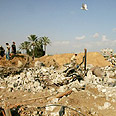
Forgotten in Gaza
They barely get four hours of sleep at night and spend their time preparing ambushes and searching for tunnels. But no one hears about them. After all, when the same thing is happening in Lebanon, does anyone still remember Gaza Strip?
“Since the kidnapping incident in the north, we feel like we’re soldiers on a forsaken front,” confesses A., a Givati soldier from the Shaked Battalion. “It’s not just that the journalists have forgotten about us. Even the officers relate to the action differently.
"At the beginning of the fighting, when we went with the officers into the Gaza airport, you could see their eyes shining. Now, it feels like their enthusiasm has dropped. Everyone is busy with what’s going on in the north, and here in Gaza, we feel like rags.”
_wa.jpg)
IDF soldiers in Gaza (Photo: Amir Cohen)
In the days following Gilad Shalit’s kidnapping, the southern command soldiers sensed that the entire nation supported them. Their pictures were on the front pages of newspapers, and their personal stories made headlines.
Yet, in one moment, everything changed. After the abduction of Eldad Regev and Ehud Goldwasser and the onset of hostilities on the Lebanese front, the southern soldiers believed that they were swept aside, and it hurts.
Although they continue to build ambushes, search for tunnels, and clash with terrorists, they think that the public no longer cares. Since fighting broke out in the north, the Israel Air Force has captured all the glory. Meanwhile, their counterparts in the south cannot help but feel slight twinges of jealousy.
Constant danger
In the immediate aftermath of Shalit’s kidnapping, the Shaked battalion spent a few days in the Dahaniya Airport, controlling the surrounding area.
“Your life is in constant danger,” says A. “You’re patrolling with a bulletproof vest, a helmet on your head. Your weapon is loaded, and you’re scared to death. In Dahaniya, we had some shooting incidents, but luckily no one was hit.”
Last week, A. was in Rafah, searching for tunnels.
“Twenty-four hours of hard work,” he reports. “It’s not that we’re looking for war, but procedure is a funny thing. Several days ago, they told us, ‘You may be going up North.’ Everyone’s eyes lit up again. We’re fighters; we are enlisted for these types of things.
"Now, the Gaza Strip is no longer in the headlines. They’ve forgotten about us, and you feel a wrench in your heart, because you’re continuing with the grunt work. Only two weeks ago, they still came here from the Friends of the IDF. They built a tent for us with a television and games. But that was two weeks ago. Now, no one is interested in us anymore.”
Uneven division of resources
After having spent the past few days operating nonstop in Gaza, the soldiers of the 77th Brigade of the Armored Corps are similarly exasperated.
“Only yesterday, we were on the northern edge of the Strip in Beit Hanoun. Forty-eight hours in the tank, awake the entire time, and we didn’t cease our maneuvers for a second,” a soldier noted.
“We had to relieve ourselves into helmets and drinking bottles, in order to avoid disagreeable encounters with their snipers. We’re doing important work, day and night, and there is an unpleasant sensation that we’ve been forgotten.”
Most of the soldiers’ criticism is directed at what they perceive as an uneven division of resources.
“A week after they kidnapped Gilad Shalit, they brought us food from the Friends of the IDF, new uniforms, shoes, underwear, and laundry services,” the Armored Corps soldiers recount.
“Now, we have nothing. Everything has been directed to the North. It’s true that they also need it, but we don’t need any less than them. Our work is no less dangerous than that of the guys in the North.
"We eat sandwiches which are past their expiration date and don’t have bathrooms or showers. The only things that support us here are our buddies and the knowledge that we’re defending the South. The media has forgotten about us. Why don’t they also come here to take pictures for the folks back home? They should also photograph our company, so people will see that soldiers are still fighting in Gaza.”
In addition, the soldiers in the Gaza Strip are disturbed by the differences between their conditions and those of the IAF pilots.
“When I get back from an operation, my biggest prize is a shower,” a Tzabar Battalion soldier grumbles. “When a pilot in the IAF returns from a sortie in Lebanon, he can go to Burger Ranch or to a movie on the base.”
Grunt work
Yet, the soldiers of the artillery battery located in Beeri insist that they are the worst off. They claim that they are overshadowed by the same infantry soldiers who envy the IAF pilots. According to the artillery gunners, at least the infantrymen are in Gaza.
“We are torn in the field,” a gunner asserts. “All the rest of the soldiers get the honor, and we are stuck with the grunt work.”
So, does their frustration mean that they would rather be in the IAF? Apparently, it depends on whom one asks. Givati’s A., who has already gone into Gaza eight times since Shalit’s capture, says that despite the fame and honor merited by the fighter pilots, he would not trade his heavy ceramic bulletproof vest for a flight suit.
“Our routine is much more interesting,” A. explains. “We don’t just push buttons. So the pilots get all the glory. That whole cliché of the ‘best guys become pilots, and the best girls go to the pilots’ is not new, but, nevertheless, I prefer being in the infantry. When you’re fighting face to face, it’s more exciting. You can’t compare the feeling of firing a missile from a distance to killing a terrorist who is standing 50 meters (164 feet) away from you.”










